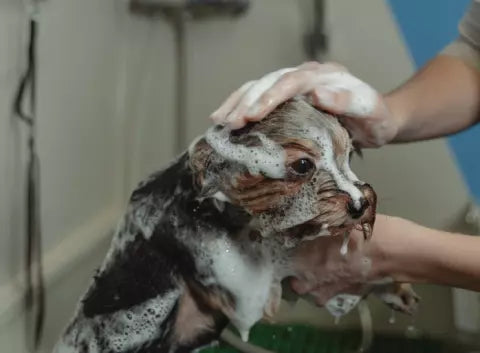
Top 10 Tips to Keep Your Dog’s Coat Looking Healthy and Shiny
Top 10 Tips to Keep Your Dog’s Coat Looking Healthy and Shiny
Your dog's skin and coat health can tell you a lot about its overall health and well-being, and your dog will probably appreciate the extra attention, too. All dog owners want to keep their dogs looking healthy and shiny, but it can be difficult to achieve if you aren't sure how to help your dog's skin and coat stay hydrated, smooth, and soft. Whether your dog has dry, itchy skin, matting or scaling of its coat, or other issues that prevent it from looking and feeling its best, there are many things you can do at home to keep your dog's coat shiny and beautiful. Here are the top 10 tips to keep your dog's coat looking healthy and shiny.
1) Importance of Omegas
A healthy diet for your dog should include a range of omega-3 and omega-6 fatty acids. Both nutrients are important for your dog's skin and coat health. The essential fatty acids aid foundation of your dog’s skin by fortifying proteins and collagen production, which can be damaged by environmental factors like sunlight, trauma, or allergies.
With a good level of essential fatty acid, your dog’s skin will be able to retain moisture and be better protected from the environment, meaning a stronger skin and a shinier coat.
Omega-3s
Omega 3 fatty acids help promote healthy skin cell production which helps the skin feel more elastic and less brittle, as well as providing anti-inflammatory properties. These can’t be produced naturally by the body, yet they are essential in the process of strengthening proteins in the skin and fur.
There are 3 common Omega-3s:
- Alpha-linolenic acid (ALA)
- Eicosatetraenoic acid (EPA)
- Docosahexaenoic acid (DHA)
Omega-6s
Similar to Omega-3s, polyunsaturated fats, Omega-6s, also can’t be produced naturally by the body. Their chemical makeup is different, with Omega-6s having six carbons on the omega of the last double bond. Omega-6s aid in cell production within the body, helping skin and fur regenerating quickly.
Three common Omega-6s:
- Gamma-linolenic acid (GLA)
- Conjugated linoleic acid (CLA)
- Dihomo-gamma-linolenic acid (GLA)
Omegas can be supplied to dogs through diet, which includes incorporating certain foods into your dog’s diet such as cold-water fatty fish like tuna, salmon, and sardines, as well as eggs, peanut butter, and plant oils. Stay away from nuts and seeds, as they can lead to digestive problems.
2. Capitalize on Protein Diet
Protein is a key component of a healthy diet for your dog. Protein provides the building blocks for cells and other tissues and is a fuel source for your pet. A dog’s coat is made up of 90% protein, and as a result, lower protein levels can be harmful to a dog’s coat health. Make sure to look for protein as a primary ingredient in your dog’s food.

3. Look Toward Natural Supplements
Supplements geared towards skin and coat health are a great way to give your dog an extra boost of minerals, vitamins, and antioxidants that support optimal health. When selecting a supplement, avoid the many out there that have fillers and chemicals that aren’t beneficial for dogs, and instead, look for the following:
- Supplements distinguished as developed by experts and scientists in the field
- Rich in Omega Fatty Acids, Collagen, Pre/Probiotic Blends, Turmeric Curcumin
- Specifically address skin and coat, omegas, digestive and allergy/immune support
4. Be Selective about Oils and Omega in Food
Dog food should have omega fatty acids, which are essential for a healthy skin and coat. Look for dog food that has Omega-3 and Omega-6 fatty acids to fight against hair loss, dry skin, or other irritations.
To maximize omega intake, look again to the Natural Supplements described above for support or the following supplements can be added to your dog’s food: flax seed oil (1 tablespoon per day); salmon oil (one teaspoon per day); avocado oil (two tablespoons per day)
5. Make a DIY Coat Mask
To give your pup’s coat some extra softness, shine, and moisture, DIY coat masks can be made, just like you might do for yourself with a DIY face mask! Try to incorporate the following key ingredients: coconut oil, honey, oatmeal, Vitamin C, Vitamin E, Aloe Vera
Coconut oil is a great remedy to dehydrated hair and skin. Applying it directly to your dog’s skin or incorporating it in your dog’s shampoo creates an instantly smoothing effect. Coconut oil also has benefits such as increasing moisture and preventing skin infections.
6. Find a Good Brush for your Pup
It’s important to brush your dog on the regular. This promotes growth of hair follicles while energizing the skin and enhancing its oil production.
Make sure to find a brush that effectively removes loose fur, which can prevent matting and increase circulation.
7. Protect against Pests
Ticks and fleas are a major concern for dogs, causing itchiness and scratch-and-bite effects. Flea control can seem daunting, but consistent vacuuming and bed washing can help sanitize and prevent homes from pests and other bugs.
Make sure to get your lawn treated as well. Pruning lawn grass reduces fleas and other pests from hopping on your pup.
8. Hydration
It’s very important for the overall health of your pet to be getting enough water throughout the day. Without this, it’s hard to maintain a shiny and healthy coat.
If your dog mainly eats dry food, this is especially important, as they aren’t getting hydration from their food whatsoever.
For improved hydration at mealtime, check out Furvor’s Bone Broth Toppers. We’ve done the work for you with our Toppers that provide protein and vitamin rich hydration to support skin and coat health.
Remember, healthy skin is hydrated skin!
9. Give your dog regular baths
You should give your dog baths around once a week using expert-approved organic pet shampoos. This helps with skin irritation and itching and supports the preservation of your dog’s coat. Make sure to avoid getting shampoo in your pup’s eyes during this process!
10. When in Doubt, Consult the Vet!
Take the time now to learn about how your dog can maintain healthy skin and fur. The better you know your dog, the better equipped you'll be for handling any potential problems down the road. It is important to be proactive about your dog's skin and coat health, so you can catch any issues before they become a problem. The best way to do this is by consulting your vet on a regular basis, but there are also many things that you can do at home to help keep your furry friend happy and healthy!
